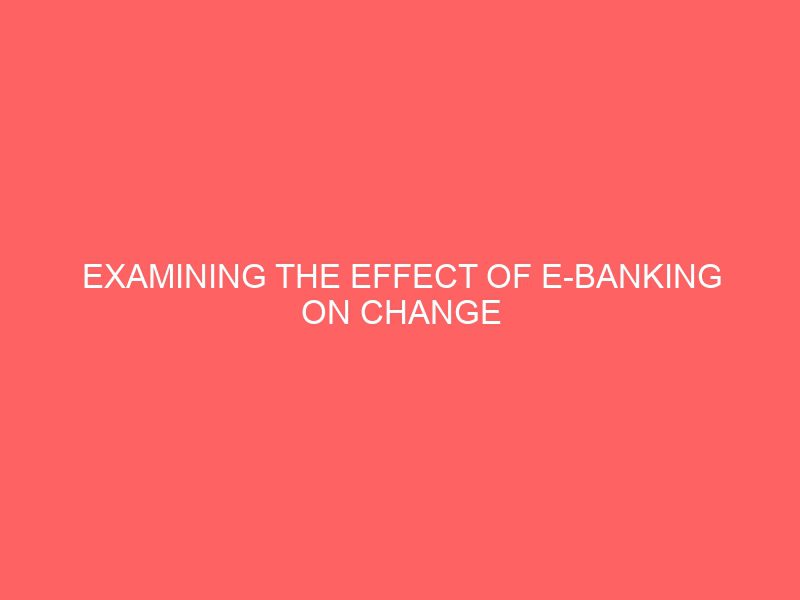Description
CHAPTER ONE
1.0 Introduction
This project is on Examining the effect of e-banking on change management in Nigeria.
The concept of Electronic Banking
Electronic banking is the utilization of electronic and telecommunication networks to render a wide scale of product and services that adds value to the customers in banks (Steven, 2012). Adoption of information technology in banking product and services is termed as electronic banking. According to a study by Ovia (2012), electronic banking is considered an e-commerce product and service in the world of financial and banking services. Banks and other financial institute are rendering services with respect of their customers who embark on varieties of e-shops
It is a coverage for the process by which a customer may carry out banking transactions electronically without visiting a brick-mortar institution (FinCen, 2012).
The business world of today, there has been a vast improvement in banking services and financial sector growth as a result of technological improvement, increase in awareness and customer demands served by banks
Banks have been known to largely utilizing technology to enhance their product and services. The 21st century banking industry operates in a very competitive and complicated environment that features these condition that is changing and very difficult to predict the economic atmosphere. In Nigeria, information and technology is a facilitator of this global change curve of an E-banking system. Information system cannot be left aside in the Nigeria banking system, this is because they are very important in recent banking activities by linking all banking activities to an information system to create efficiency and effectiveness in the banking industry.
A study conducted by Winston and Kalakota (2009) noted that the electronic payment system is gradually becoming the main focus of an online innovative business procedure as most organization look for ways to increase faster customer delivery with cost-efficiency. With this same note, Chhabra (2009) argued that the e-payment system is being functional in insurance, air ticketing, banking, retail, health, government and most especially online make. Several merits have been noted about the e-transfer mode as compare to the traditional or conventional money clearing house, this is because banks are constantly switching to information technology for payment management (Kumar, 2009). Some features include cost cutting, payment on due date, secure payment and ease of managing cash as compare to the conventional systems.
Almost all the banks are investing largely in executing the e-banking or the self-banking service with an aim of enhancing the uniqueness of their services to customers. E-banking development is supposing to reduce the banking halls and solve the issue of long waiting time of customers in banking halls. As opined by CBK (2009), ICT-based financial services have made significant impact on reducing the financial service cost.
E-Banking System in Nigeria
With the growing trend in the adoption of an electronic payment processes in Nigeria, it has become revolution that has astounded stakeholders in the financial sector. According to E-commerce Journal (2009), there has been a less than 50,000 transactions recorded four years ago on Interswitch and it has increased to over 98,000,000 per as at March 2009. The Managing Director of Interswitch, Mitchel Elegbe, a payment solutions platform provider with 25 Nigerian Banks on its platform has confirmed that the networks have experienced a progressive shift in transactions with the adoption of information technology by Nigerian. In March 2007, the network witnessed 13.6 million transactions, which then increased to 51.2 million transaction and as at 2016, $2.4 billion was recorded as an annual transaction in Interswitch. The network grew at 276.2 per cent with a volume of 271 million transactions worth N430b across its entire network from several channels-ATMs, PoS terminals, mobile, Internet, and bank branches using the network (E-commerce Journal, 2008).
Organizational Change
The concept of change is an unplanned movement from one aspect to another. Strategic change is naturally long term and it affect the whole organization and the main objectives is efficiency and effectiveness. Operational change is a short-term change and it affect the organizational sections and focus on efficiency. The idea of organizational change is widely essential and it is affected by several internal and external factors, either positive or negatively. Bringing in change impose a lot of hinderances and crisis with employees at workplace. This implies that a change in the state of operation will bring in anxiety as no one have no knowledge of how the result will be. Organizational change is a reality that is socially constructed with a bargained meaning as a result of struggles and power relationships for authority (Grant, 2005).
Kassim et al (2010) as noted that organizational change was set from incongruity that was noticed from environmental change which take the form of network of related activities that holds the procedures of constantly improving the capabilities of an individual and groups that work in a particular. Similar study conducted by Daft (2010) opined that an organization change is as a result of certain dynamism in the business environment and also results from the perception, action and choice of the manager. However, Kotler and Armstrong (2008) argued that the concept of organizational change is same as organizational transformation. They pointed out that the activity involve in change is a more complex as it is been seen or perceived by people, this is the reason why two third of all effort for organization change does not work (Szabla). Organizational goals of change vary independently of the organization, but the major ones are centralized on improving performance, eliminating and preventing organizational crisis, and capacity to go through environmental disturbance and competition.
Statement of Problem
Organizational change management is one unique factor that never be underrated as it a vital part of organizational success. Though scholars and experts have done series of research on organizational change management, but known have been able to integrate information and communication technology on organization change management. Technological change, market place, information system, global economy, social avlues, workforce characteristics and political atmosphere have a unique and significant impact on the procedures, service and product by an organization (Simons, 2010).
A study conducted by Kimani (2015) revealed that there exists a positive relationship between the adoption of information technology and organizational performance at population services, Kenya. He further opined from the results that the use of information technology explains a 82.4% increase in organizational performance at population service, Kenya.
A similar study conducted by Hannington (2013) argued that electronic banking is therefore revolutionizing the manner at which business is being conducted daily and has help to speed up service and reduce the cost of service delivery in many organizations. The study was design to analyse the relationship e-banking and the performance of commercial banks.
Taiwo & Agwu (2017) carried out a study on the role of e-banking on operational efficiency of banks in Nigeria. He argued that with the creation of the internet, coupled with the improving awareness of digital lifestyle and the introduction of e-business such as e-commerce, cash transaction is now fading away and electronic payment is being appreciated. The result from his study shows that there is a positive relationship between e-banking platform and operational efficiency.
Olayinka (2012) argued that the adoption of an electronic self-service system with the use of information technology gadget or mechanism, for the banking services provision has been used widely for last decades in emerging market around the world.
Having reviewed the above literature, none has been able to identify the effect to e-banking on organizational change management which is a crucial discourse for organizational performance. The present study will be able to fill in the gap by investigating the effect of an e-banking on organizational change management.
Research Aims and Objectives
General Objectives
Generally, the study aims at examining the effect of e-banking on change management in Nigeria Banking Sector with special reference to First Bank of Nigeria.
Specific Objectives
The study objectives will be to;
- Determine the level of e-banking technology use in First Bank Nigeria Plc.
- Examine the perception of change management in First Bank Nigeria Plc
- Investigate the impact of e-banking on change management in First Bank Nigeria Plc
Research Questions and Significance of the study
The research will be made to provide answer to the following questions;
- What is the level of e-banking technology use in First Bank Nigeria Plc?
- What is the perception of change management in First Bank Nigeria Plc?
- What are the impact of e-banking on change management in First Bank Nigeria Plc?
The study will be of benefit to researchers and academicians that desires to further their knowledge in the aspect of e-banking technologies and change management with more emphasis on identifying further issues surrounding the changes in technology in a particular organization. The research findings will be of immense of benefitting which will be used as guidelines and also a reference point to future researchers and scholars in the field of management. More platform will be provided from the result of this research in the area of change management and specifically on challenges of strategic implementation which is also an aspect of strategic knowledge management.
Due to the fact that First Bank Nigeria Plc will be used as its study’s scope with a holistic view from the Nigeria Banking Sector, the study will contribute effectively to First Bank by identifying issues surrounding change management and how e-banking implementation could help solve as a change management programme. It can also serve as a veritable source of information to the management of strategic changes.
The study will also be of immense benefit to policy makers and government on several institutions by making and implementing policies on strategic management of change. The study will also the Financial Authority like the Central Bank of Nigeria of formulating policies on introduction and implementation of new information technology to help financial institutions in terms of transparency, risk management, accountability and effective customer service delivery.
Delimitation of the Study
This study is undertaken to investigate the effect of e-banking on change management of the Nigeria Banking sector with particular reference to First Bank Nigeria Plc. The reason for using First Bank Nigeria Plc is due to the fact that is has the biggest market capitalization in Nigeria among all banks (SEC, 2018). This proposed that the researcher will make use of selected First Bank in Lagos State Nigeria.
Organization of the Study
In line with the introductory chapter, Chapter Two sets the scene for the thesis by providing a review of the literature and of the theories adopted in the study. Chapter contains a conceptual review of E-banking System, E-banking system in Nigeria, Organizational change, effect of E-banking on Organizational change and challenges of implementing e-banking as an organizational change programme. The section will also contain an empirical review of previous work on the study scope. The chapter three provides details of the research methodology adopted in the thesis. It explains the approaches chosen, data collection procedures and the techniques for analyzing data.
Chapter four include discussions, analysis and data presentation of the research finding based on field survey report and finally, the chapter five contains the discussion of the research findings in a summary form with a conclusion and recommendation of the case study followed by the references and appendixes.








Reviews
There are no reviews yet.